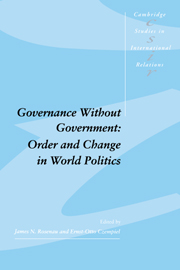Book contents
- Frontmatter
- Contents
- Notes on contributors
- Preface
- 1 Governance, order, and change in world politics
- 2 Governance without government: polyarchy in nineteenth-century European international politics
- 3 The decaying pillars of the Westphalian temple: implications for international order and governance
- 4 The “triumph” of neoclassical economics in the developing world: policy convergence and bases of governance in the international economic order
- 5 Towards a post-hegemonic conceptualization of v/orld order: reflections on the relevancy of Ibn Khaldun
- 6 The effectiveness of international institutions: hard cases and critical variables
- 7 Explaining the regulation of transnational practices: a state-building approach
- 8 “And still it moves!” State interests and social forces in the European Community
- 9 Governance and democratization
- 10 Citizenship in a changing global order
- Index
5 - Towards a post-hegemonic conceptualization of v/orld order: reflections on the relevancy of Ibn Khaldun
Published online by Cambridge University Press: 13 October 2009
- Frontmatter
- Contents
- Notes on contributors
- Preface
- 1 Governance, order, and change in world politics
- 2 Governance without government: polyarchy in nineteenth-century European international politics
- 3 The decaying pillars of the Westphalian temple: implications for international order and governance
- 4 The “triumph” of neoclassical economics in the developing world: policy convergence and bases of governance in the international economic order
- 5 Towards a post-hegemonic conceptualization of v/orld order: reflections on the relevancy of Ibn Khaldun
- 6 The effectiveness of international institutions: hard cases and critical variables
- 7 Explaining the regulation of transnational practices: a state-building approach
- 8 “And still it moves!” State interests and social forces in the European Community
- 9 Governance and democratization
- 10 Citizenship in a changing global order
- Index
Summary
In the beginning was the Word.
John 1.1.When there is a general change of conditions, it is as if the entire creation had changed and the whole world been altered, as if it were a new and repeated creation, a world brought into existence anew.
Ibn Khaldun, MuqaddimahOntology lies at the beginning of any enquiry. We cannot define a problem in global politics without presupposing a certain basic structure consisting of the significant kinds of entities involved and the form of significant relationships among them. We think, for example, about a system whose basic entities are states and of an hypothesized mechanism called the balance of power through which their relationships may be understood to constitute a certain kind of world order. From such ontological beginnings, complex theories have been built and specific cases – particular interstate relationships – can be examined. There is always an ontological starting point.
Any such ontological standpoint is open to question. All of the terms just used have ontological meanings: global politics, structure, system, states, balance of power, world order. I choose “global politics” deliberately to avoid certain ontological presuppositions inherent in other terms such as “international relations,” which seems to equate nation with state and to define the field as limited to the interactions among states; or “world system,” which has been given a specific meaning by certain writers, notably by Immanuel Wallerstein.
- Type
- Chapter
- Information
- Governance without GovernmentOrder and Change in World Politics, pp. 132 - 159Publisher: Cambridge University PressPrint publication year: 1992
- 40
- Cited by

